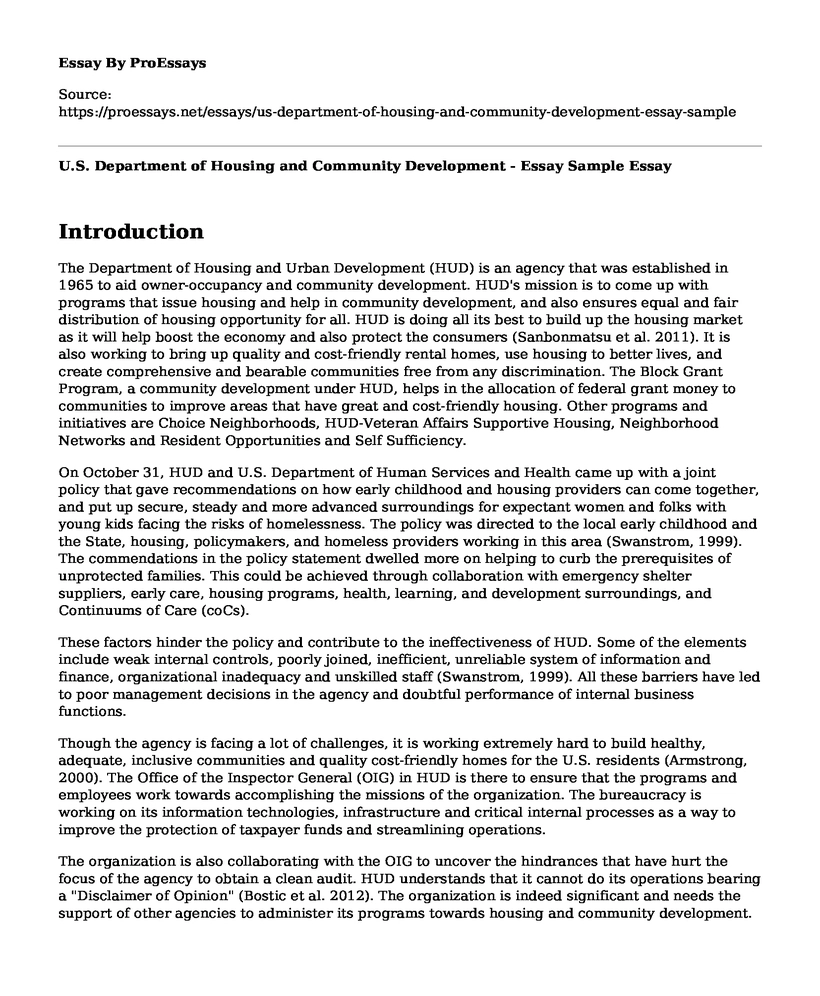Introduction
The Department of Housing and Urban Development (HUD) is an agency that was established in 1965 to aid owner-occupancy and community development. HUD's mission is to come up with programs that issue housing and help in community development, and also ensures equal and fair distribution of housing opportunity for all. HUD is doing all its best to build up the housing market as it will help boost the economy and also protect the consumers (Sanbonmatsu et al. 2011). It is also working to bring up quality and cost-friendly rental homes, use housing to better lives, and create comprehensive and bearable communities free from any discrimination. The Block Grant Program, a community development under HUD, helps in the allocation of federal grant money to communities to improve areas that have great and cost-friendly housing. Other programs and initiatives are Choice Neighborhoods, HUD-Veteran Affairs Supportive Housing, Neighborhood Networks and Resident Opportunities and Self Sufficiency.
On October 31, HUD and U.S. Department of Human Services and Health came up with a joint policy that gave recommendations on how early childhood and housing providers can come together, and put up secure, steady and more advanced surroundings for expectant women and folks with young kids facing the risks of homelessness. The policy was directed to the local early childhood and the State, housing, policymakers, and homeless providers working in this area (Swanstrom, 1999). The commendations in the policy statement dwelled more on helping to curb the prerequisites of unprotected families. This could be achieved through collaboration with emergency shelter suppliers, early care, housing programs, health, learning, and development surroundings, and Continuums of Care (coCs).
These factors hinder the policy and contribute to the ineffectiveness of HUD. Some of the elements include weak internal controls, poorly joined, inefficient, unreliable system of information and finance, organizational inadequacy and unskilled staff (Swanstrom, 1999). All these barriers have led to poor management decisions in the agency and doubtful performance of internal business functions.
Though the agency is facing a lot of challenges, it is working extremely hard to build healthy, adequate, inclusive communities and quality cost-friendly homes for the U.S. residents (Armstrong, 2000). The Office of the Inspector General (OIG) in HUD is there to ensure that the programs and employees work towards accomplishing the missions of the organization. The bureaucracy is working on its information technologies, infrastructure and critical internal processes as a way to improve the protection of taxpayer funds and streamlining operations.
The organization is also collaborating with the OIG to uncover the hindrances that have hurt the focus of the agency to obtain a clean audit. HUD understands that it cannot do its operations bearing a "Disclaimer of Opinion" (Bostic et al. 2012). The organization is indeed significant and needs the support of other agencies to administer its programs towards housing and community development.
The agency still needs to work on its policy and look into matters such as discrimination. Black people, Hispanics, and Asians find it hard to look for housing because they get discriminated. They face challenges like being denied to access and see a home and being asked more questions about their financial status (Sanbonmatsu et al. 2011). The agency also needs to employ the most skilled expertise to boost its efforts to curb homelessness rather than focusing and accounting for economic losses and low performance each year.
Over the years, HUD has been doing excellent in policy making, policy reform, and program implementation. Successful, lasting solutions should be implemented, and these include resetting the goals and priorities of all federal agencies (Armstrong, 2000). Strong leadership and excellent annual budgeting are also required to improve the organization's savings and transformation.
HUD has a real passion in Housing and Community Development, and other agencies should team up to help in providing suitable housing to the resident and help in boosting economic development. U.S. is a big country and needs agencies like HUD to be given support by other organizations to accomplish its mission.
References
Armstrong, D. (2000). A survey of community gardens in upstate New York: Implications for health promotion and community development. Health & place, 6(4), 319-327.
Bostic, R. W., Thornton, R. L., Rudd, E. C., & Sternthal, M. J. (2012). Health in all policies: the role of the US Department of Housing and Urban Development and present and future challenges. Health Affairs, 31(9), 2130-2137.
Sanbonmatsu, L., Katz, L. F., Ludwig, J., Gennetian, L. A., Duncan, G. J., Kessler, R. C., ... & Lindau, S. T. (2011). Moving to opportunity for fair housing demonstration program: Final impacts evaluation.
Swanstrom, T. (1999). The nonprofitization of United States housing policy: dilemmas of community development. Community Development Journal, 34(1), 28-37.
Cite this page
U.S. Department of Housing and Community Development - Essay Sample. (2022, Dec 19). Retrieved from https://proessays.net/essays/us-department-of-housing-and-community-development-essay-sample
If you are the original author of this essay and no longer wish to have it published on the ProEssays website, please click below to request its removal:
- The Regime Type of Russia Essay
- Essay on Challenges of Building Democracy in Egypt
- Policy Development: Regulating the Use of Social Media in Law Enforcement Organizations
- Essay Sample on Future of Coal Under Trump
- Essay Example on Congress' Power to Tax for Common Defence and Welfare
- Essay on Urban Agriculture: Safeguarding Gardens From Pathogens With Diamondback Moth Management
- Essay Example on Democracy: Vested in the People, Not Always Honored?







